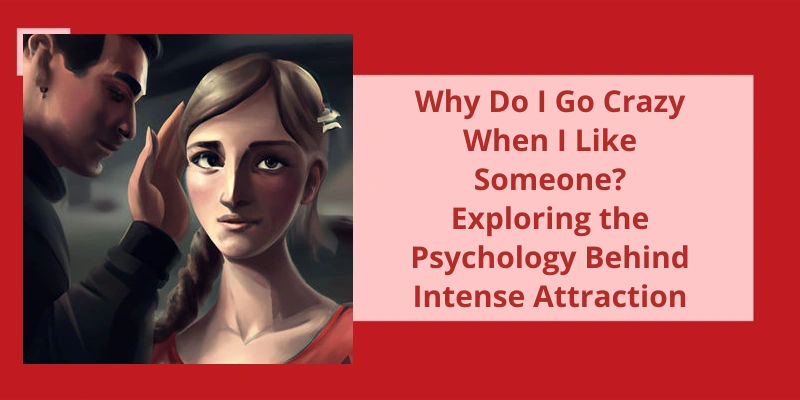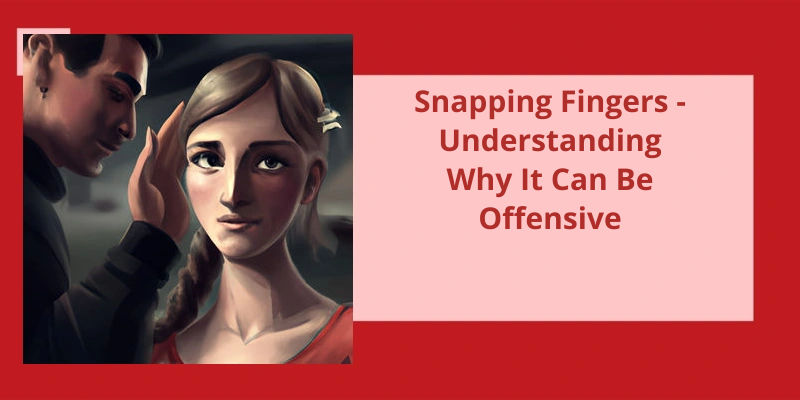When it comes to matters of the heart, it's not uncommon for people to experience a wide range of emotions, from intense happiness to overwhelming anxiety. However, there are times when these feelings can tip over the edge, leaving you feeling like you're losing your mind. In particular, when you’ve a crush on someone, it's not uncommon to feel like you're going crazy. It's not just your imagination – there's a physical reason for this. Falling in love triggers a cascade of chemical reactions in your brain and body, causing a rush of hormones that can make you feel euphoric and excited. Unfortunately, this can also lead to irrational thoughts and behavior that can leave you feeling like you're out of control. So the next time you find yourself head over heels for someone and feeling like you're going crazy, just remember that it's all thanks to your hormones going wild.
Can Having a Crush Give You Anxiety?
Anxiety can certainly arise when you’ve a crush on someone, as the feeling of infatuation can be overwhelming and all-consuming. For many people, the thought of confessing their feelings to their crush or even approaching them can be terrifying, leading to feelings of nervousness, restlessness, and even physical symptoms like sweating or shaking. This can be especially true if you’ve a history of social anxiety or have struggled with romantic relationships in the past.
Aside from the fear of rejection, having a crush can also stir up feelings of self-doubt and insecurity. You may find yourself constantly questioning if youre good enough or if the other person is interested in you, which can be incredibly stressful and draining. This can be particularly difficult if you’ve a tendency to compare yourself to others or struggle with confidence issues, as it can magnify these underlying issues.
However, it’s important to note that not all anxiety related to crushes is negative. In some cases, the excitement and anticipation of a potential new relationship can be invigorating and energizing. It’s normal to feel a little nervous or uncertain when youre getting to know someone new, and this can actually be a healthy part of the dating process. The key is to recognize when your anxiety is becoming overwhelming or detrimental to your well-being and take steps to manage it effectively.
By being honest with yourself about your emotions and taking steps to manage your anxiety, you can navigate the ups and downs of romantic attraction in a healthy and fulfilling way.
How to Differentiate Between Healthy Nervousness and Anxiety in the Context of Crushes
Healthy nervousness is an expected feeling of excitement or anticipation when approaching a crush, while anxiety is a more intense and persistent feeling of fear or nervousness that can interfere with daily life. A healthy level of nervousness may come and go, while anxiety can be long-lasting and cause more physical symptoms like increased heart rate, sweating, and difficulty sleeping.
As we explore the phenomenon of love, it’s important to understand the biological basis behind it. While love is often romanticized and considered an enigmatic force, recent scientific studies have revealed that certain chemicals in the brain are responsible for the intense emotions associated with being in love. In fact, these same chemicals are also linked to addiction and psychological disorders.
Can Being in Love Make You Crazy?
When one falls in love, it’s common to feel an intense rush of emotions unlike any other. From the flurry of butterflies in your stomach to the constant thoughts of the other person, love can consume ones mind and body entirely. It’s often said that love may make one crazy, and, to a certain extent, this statement may hold some truth. The brains chemical reactions during the early stages of love are similar to those seen in people who suffer from addiction and mental disorders such as obsessive-compulsive disorder (OCD).
Researchers have discovered that when a person is in love, their brain is flooded with chemicals, including dopamine, oxytocin, and norepinephrine. Dopamine, a neurotransmitter responsible for feelings of pleasure and reward, creates a euphoric feeling when one sees, hears, or even thinks about their loved one. On the other hand, oxytocin, known as the “love hormone,” is responsible for bonding and attachment, and it reinforces the love felt between partners. Norepinephrine, which is associated with the “fight or flight” response, increases heart rate and blood pressure, causing many of the physical symptoms often experienced during the early stages of love.
Addiction and love share many commonalities, such as withdrawal symptoms when the source of pleasure is removed, cravings, and obsessive behavior. This could explain why some people may feel a strong urge to be with their loved one, even when it may not be the best decision for their mental well-being.
The symptoms of OCD, including obsessive thoughts and compulsive behaviors, are known to be associated with low levels of serotonin. Interestingly, serotonin levels decrease during the early stages of love, which may explain why some people exhibit obsessive behaviors towards their partner.
Love may not be as mysterious as we think. While love can bring immense joy and happiness, it’s important to understand the potential impact it may have on ones mental health.
The intensity of being in love is incomparable to any other emotion. It can be so strong and powerful that it borders on what society deems as “crazy.” But what does it really mean to be “crazy in love?” It’s a love that consumes every thought, every waking moment, and every breath you take. It’s more than just feeling affection or a deep connection, it’s an all-encompassing passion that you can’t imagine ever living without.
What Does It Mean to Be Crazy in Love With Someone?
It means that everything you do revolves around this person and making them happy. You lose all sense of rationality and become consumed by this love.
You become willing to do anything for this person and sacrifice anything that stands in the way of your love. Even if it means going against your own principles, you’ll do it just to make them happy.
Being crazy in love also means being willing to forgive and overlook their flaws and mistakes. You choose to see the good in them and accept them for who they are, even if others tell you otherwise.
Sometimes, being crazy in love can also bring out the worst in us. It can make us possessive, jealous and controlling. We may become overly sensitive to their actions and words, analyzing every little thing they do or say.
However, true crazy love should always be rooted in respect, trust and understanding. It should never cross the line into abuse or manipulation. It may be intense, but it should never be harmful to either person involved.
It means being willing to put their needs before your own, and doing everything in your power to keep the love alive. While it can sometimes become overwhelming, it can also be one of the most beautiful and fulfilling experiences that life has to offer.
The Impact of Mental Health Conditions, Such as Bipolar Disorder or Borderline Personality Disorder, on Obsession in Relationships.
This article explores the effects of mental health conditions like bipolar disorder and borderline personality disorder on relationship obsession.
While falling in love may seem like a romantic and exhilarating experience, it can also come with it’s fair share of stressors. Whether it’s the fear of rejection or the pressure to impress, the act of liking someone can be overwhelming. And for many people, this stress can actually be physical, manifesting as a pounding heart, sweaty palms, and other physical symptoms. So why does something so seemingly positive cause us so much stress? Let’s take a closer look at the science behind it all.
Why Is Liking Someone So Stressful?
There are many reasons why liking someone can be so stressful. One of the main reasons is the fear of rejection. When you develop feelings for someone, it can be difficult to work up the courage to tell them. The fear of being turned down can be overwhelming, and it can create a lot of anxiety and stress. This fear can be compounded by the social pressure to be in a relationship, which can add to the stress and anxiety that you feel.
When you’ve feelings for someone, you’re often unsure if they feel the same way. This uncertainty can be very stressful, and it can lead to a lot of doubt and insecurity. This uncertainty can also cause you to second-guess yourself and your feelings, which can add to the stress and anxiety that you feel.
You may think about them all the time, which can be very distracting and overwhelming. This can make it difficult to focus on other aspects of your life, which can create additional stress and anxiety.
When you’ve feelings for someone, you’re often passionate and intense in your emotions. This can be a very exhilarating feeling, but it can also be very overwhelming. These emotions can be difficult to manage, and they can create a lot of stress and anxiety.
There are no guarantees when it comes to relationships, and this uncertainty can create a lot of stress and anxiety. You never know what the other person is thinking or feeling, which can make it difficult to plan for the future. It can be difficult to manage your emotions, deal with uncertainty, and handle the fear of rejection. However, despite the stress and anxiety that comes with liking someone, it can also be a very rewarding experience. The key is to manage your stress and anxiety in healthy ways so that you can enjoy the experience of liking someone without it becoming overwhelming or unhealthy.
Research on the Psychological and Physiological Effects of Stress and Anxiety When It Comes to Liking Someone
Studies have been conducted to investigate the impact of stress and anxiety on one’s feelings of attraction towards another person. Researchers have examined the role of hormones and neurotransmitters in relation to stress and anxiety, and how they can affect the way people perceive and respond to romantic stimuli. Findings have shown that stress and anxiety can both enhance and inhibit feelings of attraction, depending on individual differences and contextual factors.
It’s not uncommon to feel a rush of emotions when you’ve a crush on someone. From the butterflies in your stomach to the inability to concentrate, it’s a natural part of the attraction process. But have you ever wondered what exactly is happening to your body when you like someone? The answer lies in the release of certain chemicals that can affect everything from your appetite to your sleep habits.
What Happens to Your Body When You Like Someone?
When you’ve a crush or are developing feelings for someone, your body undergoes a series of chemical reactions that influence your physical and emotional state. One of the most notable changes is the release of dopamine and norepinephrine, which are neurotransmitters associated with pleasure and excitement. These chemicals flood the brain and create a rush of positive feelings that can be quite intense.
In addition to the release of dopamine and norepinephrine, other hormones and chemicals also play a role in the physical effects of attraction. For example, testosterone levels may increase in both men and women during the early stages of romantic interest, which can lead to heightened sexual desire and aggression. Estrogen levels may also fluctuate in women, potentially leading to changes in mood, energy, and other physical symptoms.
Interestingly, the changes in your body when you like someone can also have an impact on your immune system. Studies have shown that when you’re experiencing a romantic attraction, your body produces higher levels of the hormone cortisol, which can suppress immune function. This may help explain why people are more likely to get sick when they’re feeling stressed or anxious, especially if those feelings are associated with relationship-related issues.
Another potential effect of being attracted to someone is a change in your behavior. When we’re interested in someone, we tend to pay more attention to them and seek out opportunities to be around them. This can lead to changes in our daily routines, as we may forgo other activities in order to spend more time with the person we like.
Overall, the physical and emotional changes that occur when you like someone are a natural and normal part of the human experience. While the effects may vary from person to person, they’re generally characterized by increased levels of pleasure, excitement, and a desire to be close to the object of your affection. So if youre feeling these effects, know that youre not alone – it’s just your body doing it’s thing!
How Attraction Affects the Brain and It’s Neural Pathways
Attraction triggers a series of chemical reactions in the brain, causing the release of dopamine, norepinephrine, and serotonin. These chemicals activate the brain’s reward system, producing pleasurable feelings and reinforcing the desire for the object of attraction. Over time, these repeated experiences can lead to the formation of new neural pathways, strengthening the connection between the brain’s reward center and the object of attraction.
Conclusion
In conclusion, the phenomenon of going crazy when you like someone isn’t something that can be avoided or controlled. These changes can leave you feeling euphoric and exhilarated, akin to the rush experienced after intense physical activity. While it may seem overwhelming at times, it’s important to remember that this experience is an integral part of the human experience, and something to cherish and appreciate. So embrace the madness, and enjoy the ride!






